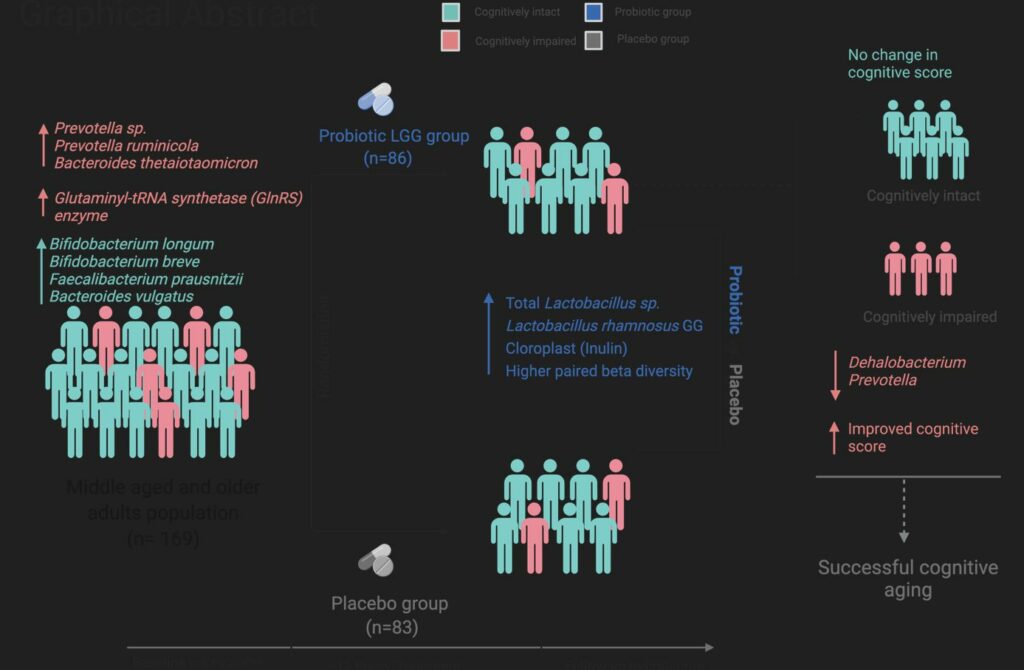A new early and non-invasive treatment for age-related cognitive decline
Can taking a probiotic prevent age-related memory and thinking decline?
Recent scientific insights emphasize the vital part the gut plays in preserving brain functionality.
A new research project infers that the intake of probiotics might deter the deterioration of memory and cognitive skills often seen in elderly individuals. These studies have the potential to lay the foundation for innovative, non-invasive therapies utilizing the gut microbiome to lessen cognitive decline in seniors.
The research shows that participants exhibiting mild cognitive impairment showed an uplift in their cognitive scores after three months of receiving the LGG (Lactobacillus rhamnosus GG) probiotic. This boost in cognitive performance corresponded with alterations in their gut microbiome.
“The implication of this finding is quite exciting, as it means that modifying the gut microbiome through probiotics could potentially be a strategy to improve cognitive performance, particularly in individuals with mild cognitive impairment,” commented Mashael Aljumaah, a PhD candidate in microbiology at the University of North Carolina at Chapel Hill and North Carolina State University. “This adds a new layer to our understanding of the microbiome brain-gut connection and opens up new avenues for combating cognitive decline associated with aging.”
Many pieces of research concentrate on severe cognitive diseases like Alzheimer’s and dementia. However, these conditions are far more progressed, hence significantly harder to treat or reverse.
“In contrast, we focused on mild cognitive impairment, which can include problems with memory, language, or judgment. Interventions at this stage of cognitive impairment could slow down or prevent the progression to more severe forms of dementia,” Aljumaah added.
How can the gut microbiome composition serve as an early indicator for mild cognitive impairment?
The study included 169 participants aged between 52 and 75 years who were divided into two groups based on the presence or absence of neurological issues or mild cognitive impairment.
Within each group, participants were administered either the LGG probiotic or a placebo in a double-blind, randomized clinical trial that lasted three months. The selection of the LGG probiotic was influenced by previous research which indicated its potential positive impacts in animal models.

The research team employed 16S rRNA gene sequencing to identify and contrast bacteria in stool samples of the study participants in order to study their gut microbiomes. Following this, they used whole-genome sequencing to further understand the functional roles of the identified bacteria.
The analysis pointed out that a higher relative abundance of microbes belonging to the genus Prevotella was observed in participants with mild cognitive impairment than in those without.
This indicates that the composition of the gut microbiome could potentially act as an early warning sign for mild cognitive impairment, presenting chances for early interventions to hinder cognitive decline.
What are the beneficial effects of Lactobacillus rhamnosus GG (LGG) probiotic?
Among participants suffering from mild cognitive impairment who were given the LGG probiotics, a reduction in the relative abundance of Prevotella was observed.
This change coincided with improved cognitive scores, implying that cognitive health in the elderly could be enhanced by altering the gut microbiota.
“By identifying specific shifts in the gut microbiome associated with mild cognitive impairment, we’re exploring a new frontier in preventive strategies in cognitive health. If these findings are replicated in future studies, it suggests the feasibility of using gut microbiome-targeted strategies as a novel approach to support cognitive health,” the author added.
They are currently investigating the particular mechanisms through which bacteria like Prevotella influence the gut to promote brain health.
In particular, they are examining how certain molecules generated by these bacteria can regulate the functionality of neuroprotective hormones that can traverse the blood-brain barrier.
Aljumaah, also associated with King Saud University in Saudi Arabia, will present these discoveries at NUTRITION 2023, the prestigious yearly convention of the American Society for Nutrition taking place in Boston from July 22-25.
Image Credit: Shutterstock
